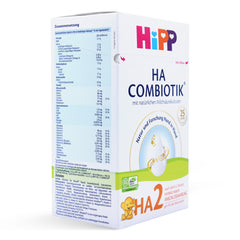What’s the Difference Between European and American Baby Formulas?
European vs. American Baby Formula: What Parents Need to Know
A child's health is the most important thing for parents. Parents choose baby formula based on their baby's health and digestive needs. Today's baby formulas are popular because of their high-quality ingredients and similarity to breast milk. Consulting with a pediatrician helps parents choose a reliable and high-quality formula.
The question of European vs. American baby formula is making more parents think carefully about their choices. Both formulas are popular in the market and have their own advantages. However, it's important to understand their quality and impact on children's health. European formulas have stricter certification and testing standards.
Parents should research all the pros and cons of US baby formulas vs. European. To make the right decision, parents should evaluate the ingredients, regulatory compliance, and quality. Safety and nutritional value are the main criteria when choosing baby formula.
How Ingredients Differ: European vs. American Baby Formula
Understanding the differences between American and European formulas is important for parents making informed decisions. A quality formula enriched with essential vitamins and minerals benefits your baby's development. Here are the key differences between European and American formulas:
-
Organic standards. US formulas allow certain additives and don't always meet the strictest organic requirements. European formulas often have better certification and meet stricter organic standards. Many European manufacturers avoid GMOs due to higher quality standards.
-
Source of carbohydrates. Understanding ingredient differences is important for your baby's health. US formulas may contain corn syrup and other processed carbohydrate sources. European formulas typically use lactose and natural sugars, staying closer to breast milk composition.
-
Oil mixtures. The fat content also differs due to European ingredients vs American quality standards. Both formulas use vegetable oils as the main fat source. European formulas minimize the use of palm oil or keep it in smaller quantities.
-
DHA and ARA content. Most European formulas include minimum levels of DHA and sometimes ARA as standard ingredients. American formulas use these important fatty acids, but they're not always mandatory additions.
-
Protein composition. European organic baby formulas typically use hydrolyzed or whole milk protein sources. US formulas often use soy protein or skim milk protein alternatives.
-
Additives and preservatives. US formulas are generally safe but may contain more additives and preservatives. Organic baby formulas in Europe are more strictly limited by regulations. Both types of formulas must meet safety and expiration date standards.
-
Probiotics and prebiotics. US formulas may contain probiotics and prebiotics, but they're not always emphasized as primary ingredients. European formulas often include probiotics and prebiotics as standard components.
Why Are European Formulas Often Seen as "Cleaner" or "Better"?
European formulas such as Kendamil, Holle, and HiPP are gaining popularity among American parents. Many parents wonder whether European baby formulas are actually better and what specific benefits they offer. European formulas are often more strictly regulated regarding certain additives and synthetic ingredients.
Is European baby formula better? Manufacturers focus on organic certification and compliance with strict European Union requirements. This certification often indicates the avoidance of synthetic preservatives and artificial ingredients. European formulas undergo extensive testing before reaching the market. Manufacturers must avoid heavy metals, GMOs, and synthetic pesticides in their products.
One of the most significant advantages is avoiding ingredients that may cause health concerns. Parents often prefer European formulas because manufacturers use ingredients that more closely mimic breast milk composition. Such formulas appeal to health-conscious parents who prioritize natural ingredients. The use of nutritious fats and high-quality organic ingredients is often mandatory under European regulations.
Why is the European formula better? European quality standards require healthy fats, proteins, and carbohydrates that support infant development. European formulas are designed to accommodate different types of baby health needs. Specialized options like lactose-free and hypoallergenic formulas are widely available. The focus remains on high-quality ingredients, organic certification, and minimal processing.
How Regulations and Manufacturing Standards Compare

The question of European vs. American formula standards remains important for parents comparing safety and quality. Both types of formulas must comply with strict government regulations for infant safety. European formulas are regulated by the European Food Safety Authority (EFSA) and have strict manufacturing standards. American formulas comply with FDA guidelines and are also controlled by federal agencies.
Both options are considered safe and nutritious for babies when properly manufactured. Here's how top European baby formula typically break down by age stages:
-
Stage 1: Formula for newborns from birth to 6 months
-
Stage 2: Formula for babies from 6 months to 12 months
-
Stage 3: Formula for toddlers 12 months and older
Each stage is designed according to babies' changing digestive systems and nutritional needs. American formulas often include wider age ranges from birth to 12 months, which requires careful selection. European formulas comply with organic certification requirements and emphasize ingredient transparency.
A good example of quality European baby food is HiPP HA Stage 2 Formula for babies 6 to 12 months old. This formula includes essential nutrients and is designed to be hypoallergenic for sensitive babies. European formulas are typically formulated according to strict regulations and avoid corn syrup solids. European formulas generally undergo more rigorous quality control testing than their American counterparts.
Should You Switch to a European Formula? Things to Consider
Many parents wonder why the European formula is better than the American alternatives. European formulas have become increasingly popular among American parents seeking premium infant nutrition. European quality standards allow parents to access formulas that undergo extensive certification testing.
American formulas are also good options, but certain factors influence many parents' preferences for European alternatives. One of the main advantages of European nutrition is the emphasis on high-quality, organic ingredients. European formulas often avoid unnecessary additives that might cause allergic reactions in sensitive babies.
European formulas typically use lactose as the primary carbohydrate source, closely mimicking breast milk composition. This approach often leads to improved digestion in babies due to more natural ingredient profiles. However, it's important to understand that European formulas typically cost more than American alternatives. Premium production standards require higher manufacturing costs and more stringent quality control.
When comparing US vs. European formulas, parents should understand both the differences and potential advantages. European formulas can be more difficult to find in regular American stores and may require online ordering.
Before choosing any formula, parents should consider not only ingredients but also their baby's specific health needs. Consulting with a pediatrician helps identify potential allergic reactions and allows proper testing of your child's tolerance. Based on medical guidance, parents can choose a high-quality formula that works best for their baby. Working with a pediatrician also helps ensure safe transitions when switching between different formulas if necessary.
Both European and American formulas can be excellent choices for many families, depending on individual needs and preferences.








